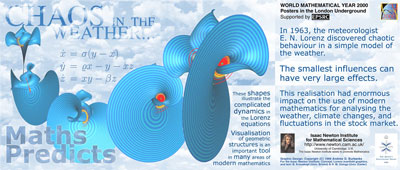|
Math 3260
DIFFERENTIAL EQUATIONS Fall 2004
Instructor Andrey Shilnikov,
Dr.
Office 724
COE building (map)
Phone (404) 651-0655
e-mail ashilnikov at mathstat.gsu.edu
web http://www.mathstat.gsu.edu/~matals
ClassRoom GCB 615
Days & Time MW 13:30 - 14:45
Office hours MW 12:30-13:00 and 15-15:30, and by appointment
Computer # 81492
Prerequisite Prerequisite: Grade of C or higher in
MATH 2215.
Description: First-order equations, linear differential equations
with special emphasis on constant coefficient and Euler equations,
systems of equations, applications.
Textbook: A first course in Differential equations with modeling
applications, 7th ed. by D. Zill, ISNB 0534379990 *Interactive diffirential equations* are here
 Outline of Content (tentative)
Outline of Content (tentative)
|
Sects. |
| Introduction to Ordinary Differential
Equations; |
1.1-1.3 |
| 1st order Odes; |
2.1-2.5 |
| Modeling with 1st order Odes |
3.2-3.3 |
| Higher-order Odes |
4.1-4.7 |
| Modeling with higher-order
Odes |
5.1-5.2 |
| Systems of linear firts order Odes |
8.1-8.2 |
| Numerical Methods |
2.6, 9.1-9.3 |
Tests and Grading Grades will be determined
on the basis of 4 tests (each 100 points) and homeworks (100 points).
The lowest test grade will be dropped. The final grade will
be awarded as follows: 90%-100% =A; 80%-90%
= B; 70%-80% = C; 60%-70% = D; I
will then go over each person's work individually and modify
the tentative grades slightly, taking into
account factors that are hard to quantify such as improvement,
an outstanding final exam, etc. There is no preordained
median for this course. It could be higher or lower in any
given year, depending on how the class does. However, I would
not hesitate to give 90% of the class an A if they earned
it.
Exam dates (subject to change)
Tests I, II and III September
13, October 13 and November 10
Final Examination December 15 @ 12:30
or will be rescheduled earlier
Sep. 6 and Nov. 23-27 no classes.
Please check the test dates in your other courses and let me know
as soon as possible if there are conflicts. The usual solution
in such cases is to give the exam early or late on the scheduled
day. NOTE October 15 is the last day to withdraw from
the class without receiving an automatic “WF”. Conditions
under which an incomplete “I” is given can be found
in the 2004 General Catalog. You will not be able to use your
notebook or textbook on all tests. No calculators. An answer alone
will not suffice the credit. You must explain how you arrived at
your answer
"Note: During the first two weeks of the semester the Department
of Mathematics and Statistics checks the computer records to determine
whether or not each student has met the prerequisites for this course.
If you do not have the prerequisites, please inform your instructor
and change to another course right away. If our computer search
finds that
you do not have the prerequisite, you must drop this course or you
will be dropped automatically. Furthermore, you will be administratively
dropped if you miss more than 3 classes."
Important!!! The following policy on Administrative
drops was adopted on the December 2003 Senate md
exam may be made up only in the event of a verifiable,
unavoidable absence (e.q., a doctor’s note is necessary
if illness is an excuse). Failure to take the
final exam will result in a grade of “F” for the course
Homework assignments
are here.
Homework The homework is the most important
part of the course. No matter how well you think you understand
the material presented in class, you won't really learn it until
you do the problems. Late homework will not be accepted except in
very unusual circumstances. We will, however, drop the lowest homework
and quiz grade. You are free to devise whatever strategy for learning
the material suits you best. This may involve collaboration with
other students. We believe, however, that most people will get the
maximum benefit from the homework if they try hard to do all the
problems themselves before consulting others. In any case, whatever
you turn in should represent your own solution, expressed in your
own words, even if this solution was arrived at with help from someone
else. Remember, you are doing the homework in order to learn the
material; don't try to defeat the purpose of it. Do not get behind
your work. As a guide, consider spending 2 hours of your time studying
for each hour of class time. On a test you must be able to
work the problems within the period of time allowed. Therefore,
it is recommended, as part of your preparation for each test
, that you select 8 to 10 problems and try to work them within a
period of one hour. The tests ill consist of 6-8 problems usually
selected from similar problems assigned as homework. Success in
the course is highly correlated with regular attendance and punctual
completion of homework.
Cheating/Plagiarism All work submitted for grading must
be your own. A first occurrence of cheating/plagiarism will result
in a grade of “O” for all concerned parties, as
well as a form indicating academic dishonesty will be filed with
the Dean of Students.

|

